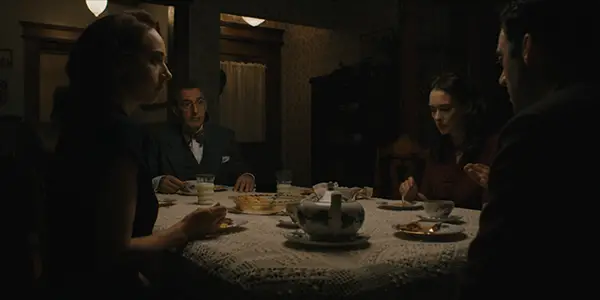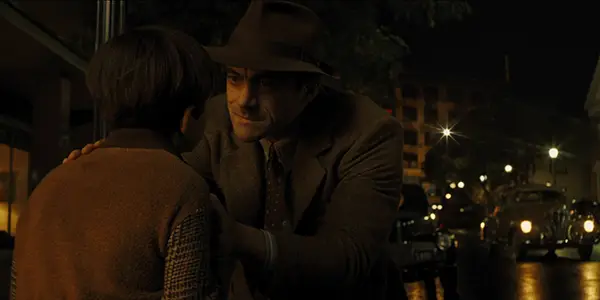THE PLOT AGAINST AMERICA “Part 4”: The Judgment Of History

Digital Media Program Coordinator and Professor at Southern Utah University…
It’s been nearly a year since Lindbergh’s election, and the Jewish community is divided. In Part 4 of The Plot Against America, confusion and conflict borne of misinformation drive wedges between friends and family, while the war rages on in Europe.
Episode Summary
The Jewish community in America has essentially been divided into two groups: those who still think Lindbergh is a dangerous anti-Semite, and those who have changed their minds due to what they see as a lack of evidence for any negative legislation imposed on them directly by the President (Ben Cole). Instead, the latter group sees a strong economy and job security. Herman’s brother, Monty (David Krumholtz), sees his business booming and begins to believe that Lindbergh has outgrown the anti-Semitic comments he made prior to the election. Herman (Morgan Spector), of course, believes the opposite. Both men see the same events, the same evidence, and interpret according to their own beliefs.
Similarly, Bess’ sister Evelyn (Winona Ryder), now working with fiancé Rabbi Bengelsdorf (John Turturro) on the “Just Folks” program, clashes with the family when she secures an invitation directly from President and Mrs. Lindbergh (Caroline Kaplan) for Sandy (Caleb Malis) to attend a dinner where German Foreign Minister von Ribbentrop (Orest Ludwig) will be in attendance. Furious, Bess (Zoe Kazan) scolds her sister for going behind her back: “You had no right!”

Meanwhile, Alvin (Anthony Boyle) remains in a veterans hospital in Canada, languishing in a deep depression. Herman visits him and assures him that he always has a home with the Levin family. Eventually, Alvin returns home, but as a shell of his former self. He learns to walk with a prosthetic leg and takes a job at Monty’s store. However, an intrusive FBI agent (Lee Tergesen) forces Monty to fire Alvin, and stirs up trouble for the Levin family, pursuing the hollow notion that Alvin is a communist.
Strong Commentary on Confirmation Bias
One of the most intriguing aspects of Philip Roth’s novel, and of this brilliant adaption by David Simon and Ed Burns, is each character’s tendency toward confirmation bias, or the human inclination to “filter out” evidence that goes against our preconceived notions. We disregard ideas that go against what we believe, accept ideas that support what we believe, and for the ideas in between, we come up with our own “facts” to bend them our way.
More than any other single reason, confirmation bias is behind our current political divide, as well as much of the contention throughout history. How many times will war be justified by claims of divine right on both sides? How many conflicts have been fought over land or resources claimed by both sides? How long will our political partisanship continue, wherein the moral high ground of many different subjects is claimed by both sides? Clearly, in all of these examples and innumerable others, both sides cannot be right, and yet both insist they are. Why? Confirmation bias.

This episode has, more than any thus far in the series, showcased the human inclination toward this fault. Herman and Monty, brothers who sat together as they listened to Bengelsdorf’s campaign speech just a year ago, now find themselves bickering and arguing over what they each see as evidence of their own image of President Charles Lindbergh. Herman accuses Monty of being unable to see beyond the increased success of his business, while Monty accuses Herman of being paranoid and unforgiving of mistakes he thinks Lindbergh has outgrown.
Our Greatest Teacher
In the end, of course, history will always side with the oppressed, even though it may take a lot of time for the oppressor to eventually grow to an understanding. The brilliance of The Plot Against America is how it uses young Philip’s growing pains as a device to represent the country’s growth as well. Supporting Lindbergh are Evelyn, Bengelsdorf, and Sandy. Standing against him are Herman, Bess, and Alvin. Insults and contempt fly back and forth between these two groups, as the wedge between them drives itself deeper and deeper. Somewhere in the middle is Philip, who is pulled back and forth between members of his own family, unable to reconcile the conflicting evidence given by both.
On the one hand, he wants to be excited for the opportunities with the President that Sandy and Evelyn enthusiastically talk about. On the other hand, he sees the genuine fear in his parent’s eyes when they talk about Lindbergh and the danger he brings. Over time, Philip begins to learn which side will ultimately be proven justified. The power that teaches him this lesson, indeed, the power that teaches all the greatest lessons in life, is love.
Two moments in this episode, one with his mother and the other with his father, perfectly portray the teaching of these essential life lessons. Brilliantly, they do so both as a perfect depiction of what it’s really like to experience these moments as a child, but also as a larger lesson for a growing society as well, both in the story’s 1940s as well as our modern reality.

Walking home one evening, FBI agent McCorkle pulls up next to Philip and begins to question him. The boy is clearly terrified, and when the encounter ends, he runs home to what he believes will be safety. Instead, he arrives to see the flashing lights of an ambulance and sees a corpse being rolled out of his home toward the vehicle. The patriarch of the neighboring apartment, after a long sickness, had just passed away. Bess, Philip’s mother, sees the boy coming and embraces him. She tries to speak comfort to him but is at first unaware that the already terrified child believes it is his own father that is trapped under the sheet.
When Bess realizes this, the emotions that cross her face are incredibly powerful. In this moment, the viewer relates to both the mother, as a caregiver, and the child, who is experiencing a terrifying fear, no matter how irrational it may be. It’s an incredible moment, and brilliantly performed. Bess drops to her knees and earnestly looks up at her son. She tries her best to explain the concept of death, while assuring the boy that his father is healthy and standing just inside the house. All the love in the world is shared, even in fear, between a mother and her son.
Later, Philip sneaks into the theatre to watch his Aunt Evelyn on the newsreels as she attends the President’s dinner. He is caught by the theatre owner, who calls his father to come pick him up. Herman is furious and drags Philip by the arm toward the car. When Philip tries to pull away, Herman raises his hand to strike before catching himself. He lowers his hand, looks at his son, and earnestly says five small words that have incredible power: “This is not a game.” Another incredibly acted moment, in which all the love in the world is shared, even in anger, between a father and his son. Understanding, Philip takes his father’s hand, and they walk together to the car.
These back to back scenes in which his mother, then his father, speak to him with such earnestness, may be the first time Philip has seen genuine, unfiltered words from either parent. There comes a point in a child’s life when the parents begin talking to them without the protective filter used until that point. Often, the watershed moment happens when the child does something that gets them in trouble, or it happens in the face of tragedy, and the parents realize thereby that the child is ready for more mature discussion. In this case, Philip experienced both.
The acting in these scenes was brilliant. The genuine concern written on the faces of parents and child, their recognition of the importance of what they were discussing, Philip’s recognizing the seriousness of what is being discussed. Incredible. Very soon, the country at large must also learn its own harsh lesson, and one can only hope that love, the greatest of all teachers, will be given a seat at the table.
The Plot Against America: Part 4 aired on April 6th, 2020, on HBO. The series is currently available to stream on HBO NOW and HBO GO.
Does content like this matter to you?
Become a Member and support film journalism. Unlock access to all of Film Inquiry`s great articles. Join a community of like-minded readers who are passionate about cinema - get access to our private members Network, give back to independent filmmakers, and more.
Digital Media Program Coordinator and Professor at Southern Utah University and Southwest Technical College; M.Ed.; Author at Labyrinth Learning and Film Inquiry. Passionate educator of film theory and history. World-class nerd with a wide array of interests and a deep love for many different fandoms.













